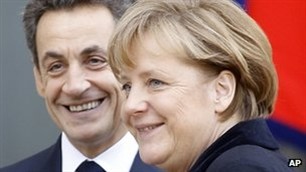Government leaders from all the EU nations will meet in Brussels on Friday for what maybe their final chance to find a way to save the Eurozone. France and Germany, the two biggest economies of Europe, have not yet reached a consensus on a number of issues, which leaves a positive outcome for the summit in grave doubt.
The public debt crisis has exposed weaknesses and disagreements among EU members. Despite adopting a series of emergency measures since the previous summit, the situation has not improved. At the last summit in October, EU countries agreed to refund banks, increase capital for the European Financial Stability Facility to 1 trillion Euros, and restructure the Greek debt. However, the EU has failed to mobilize new capital for the EFSF, which has led to the strong likelihood of a eurozone collapse.
The public is anxiously anticipating the EU summit on Friday. The EU will discuss an ambitious plan to have all, or at least 17 members, agree on a new compulsory fiscal pact, which will involve amending or rewriting the treaties that govern the European Union. Whether the initiative will be adopted depends on the leadership of France and Germany.
 |
| France and Germany agree to introduce a new EU treaty |
Both have agreed to rebuild the Union by introducing a new EU treaty in March, consisting of rules to strictly control budget deficits, but have failed to specify concrete measures to realize that objective. Germany wants a tough financial management mechanism and is ready to impose sanctions. Many analysts say the German demands are appropriate since Germany is the biggest credit provider in the bloc. But, France does not want to hand over all decisions to the European Council. German Chancellor Angela Merkel wants to reform the EU treaty, while French President Nicolas Sarkozy thinks this will be too time-consuming and ambitious procedure, since it requires all EU nations’ approval. So far, the UK has shown little enthusiasm for these initiatives, while the Netherlands and Ireland have expressed concern about having to hold a referendum as they did with the Lisbon treaty.
One day prior to the EU summit, Sarkozy and Merkel met in Marseilles at a conference of the European People’s Party aiming to harmonize their opinions and persuade each other and other EU members to accept common initiatives to safeguard the Eurozone. If the EU summit fails or reaches merely an unbinding agreement, the bloc’s debt crisis will worsen and some member countries will face almost certain bankruptcy./.
Doan Trung